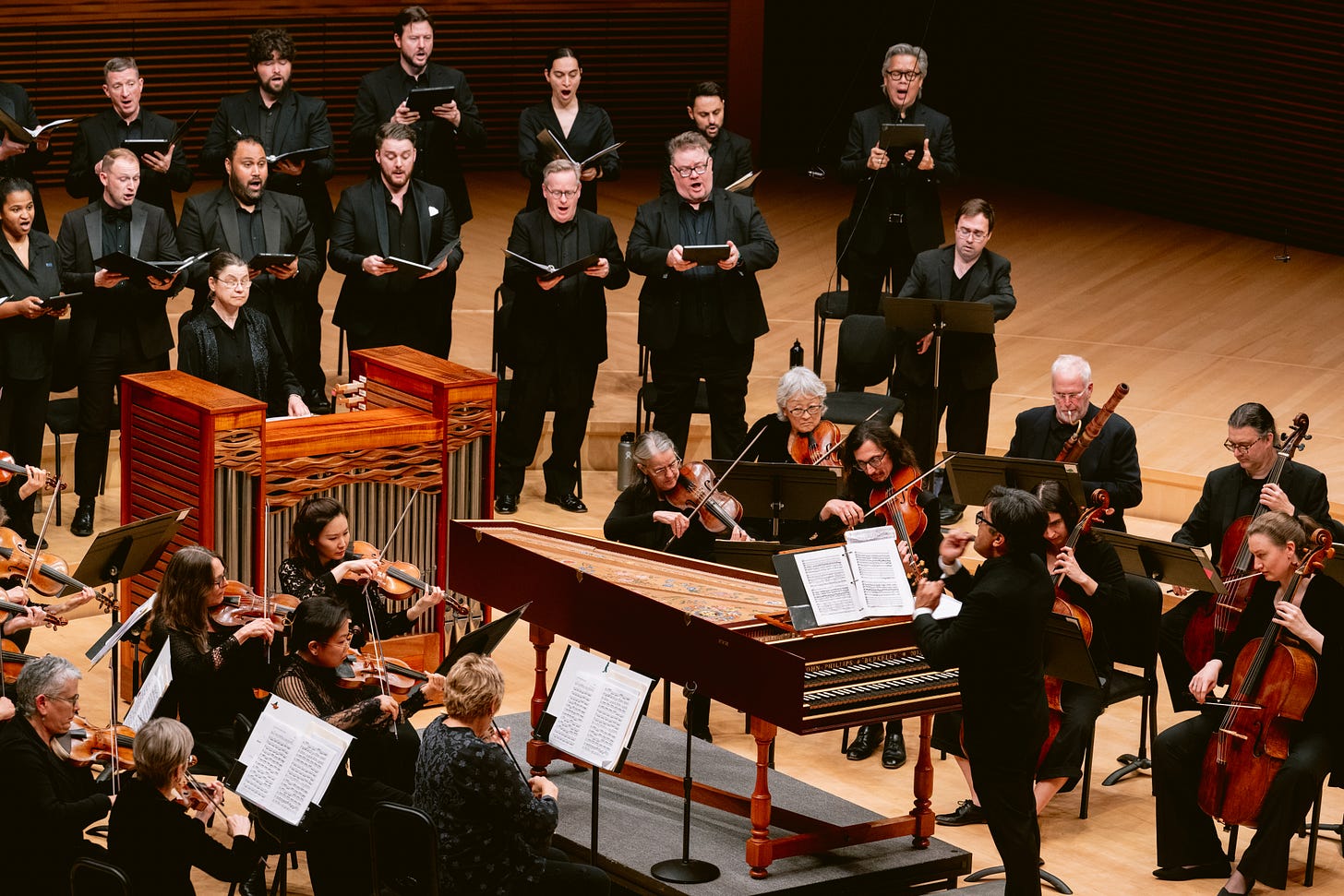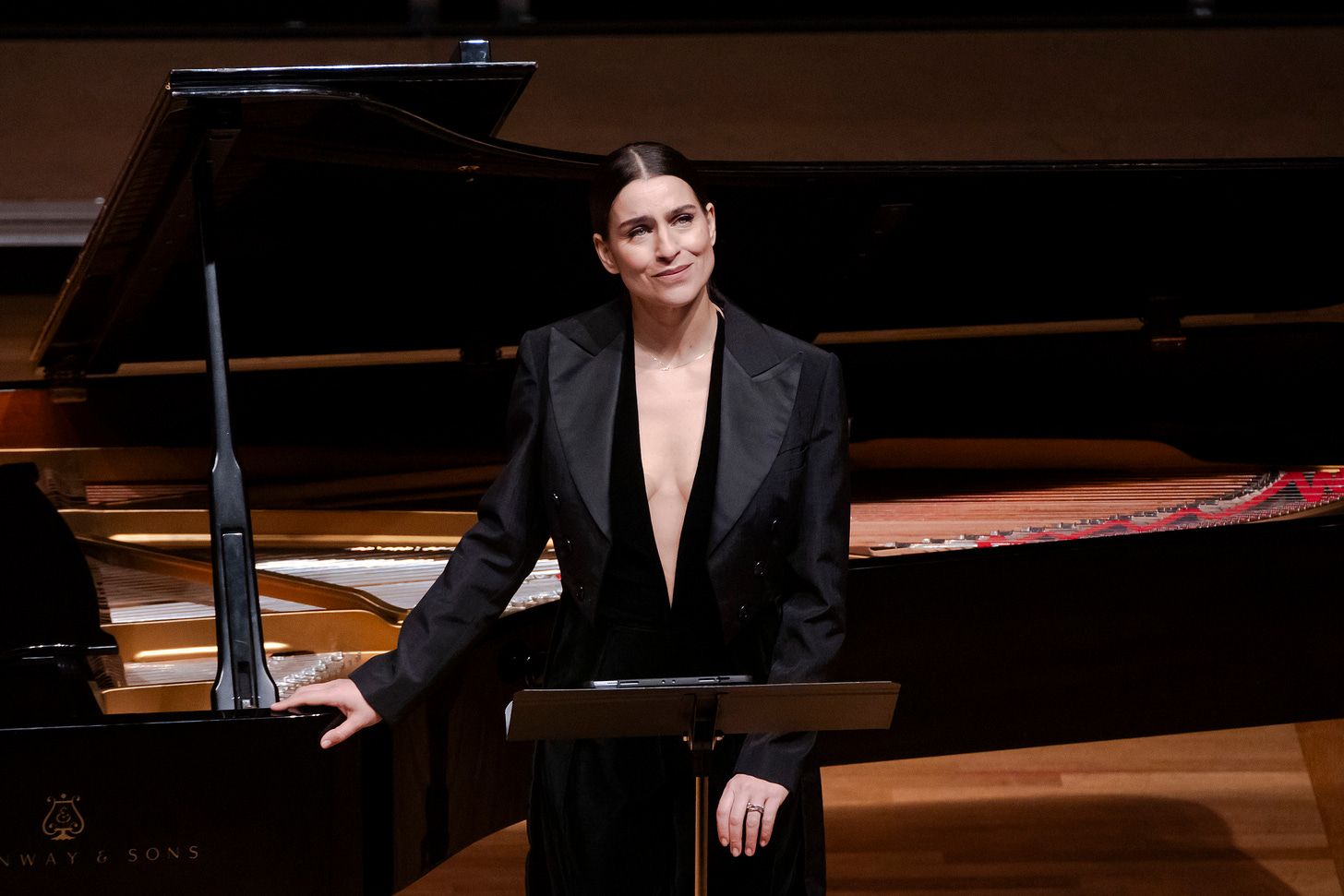Thinking outside the Bachs
A superb Christmas program by Philharmonia Baroque injected a rarely heard compositional voice into the mix

Anyone who attends classical music concerts on a regular basis hears the same damn music over and over again. Bach, Beethoven, Mozart, Stravinsky, you know the drill. Performers go through the traditional playbook, and audiences lap it up and think that that’s all there is — because if there were anything better than Beethoven, it would be on the program, right? Just as predictable are the complaints from people like me, who stamp our feet and holler about how the whole “genius or nothing” paradigm leaves out so many compositional voices, with a disproportionate emphasis on women, and people of color, and anyone who is still alive at the present moment.
But they aren’t the only ones getting short shrift. There are plenty of Dead White European Males as well whose music gets shoved off the program to make room for one more go-round of the big boys. And once we do hear something by the also-rans, we think, “OK well where have you been all my life?”
Last week, the Philharmonia Baroque Orchestra & Chorale, led by guest conductor Ruben Valenzuela, drove the point home with a superbly planned and executed Christmas program. (I heard the first of three performances, on Wednesday, Dec. 11, in Stanford’s Bing Concert Hall.) It was billed as “A Bach Christmas,” because of course it was. What are they going to say, “Here’s a breath of something new and different”? The minute they do that, the entire marketing department resigns in protest — and really, you can’t blame them. But Bach was not what the evening was about.
No, that honor went to his Baroque German colleague, a certain Christoph Graupner. Before last week, I had heard neither Graupner’s name nor a note of his music. I know better now; he’s terrific.
Valenzuela picked two items out of a strikingly voluminous legacy of compositions. (In his introductory remarks, the conductor seemed inclined to apologize for Graupner’s prolific level of production, comparing him sheepishly rather than proudly to Telemann. That’s not really what you want in a champion, but we can let it pass for now.) One was a cantata, Reiner Geist, lass doch mein Herz, one of more than 1400 (!) in the composer’s catalogue; the other, billed as an Overture in F, was a suite of eight orchestral movements (terminology for orchestral works was fluid in those days).
Both pieces were magnificent, full of ingenious harmonic and expressive strokes that placed them precisely in their time period but served as a welcome reminder that “late Baroque” and “Bach” aren’t synonymous terms. Graupner, who was just two years Bach’s senior and crossed paths with him at various points in the incestuous world of musical Germany, writes with a more delicate and populist brush. The erudition that so excites Bach’s modern-day fans, and bewildered many of his contemporaries, is not so much in evidence; in its place is a vein of immediacy, bordering at times on the sensual. The music is both beautiful and direct, without being any less structurally sturdy as a result.
Reiner Geist, which featured a fine-grained performance by tenor Nicholas Phan (a last-minute stand-in for soprano Sherezade Panthaki), is a series of four arias framed by recitatives. I was especially taken by the final number, “Ich recke schon die matten Hände” (“I already stretch my weary hands”), in which the orchestra plays jaunty jig-like accompaniments while the vocal line is draped across it in long, slow-moving phrases that never quite align.
As for the orchestral overture, it was a grab bag of character pieces in both familiar and unfamiliar styles. Some of them, such as the Bourrée and Menuet, were old friends from the traditional Baroque dance suite; an Air en Polonese, though less common, was clearly recognizable as a polonaise. But Graupner also does the French thing of throwing out a vague, fragrant title and then writing whatever the hell he pleases. A movement dubbed “Le Contentement” proved to be an evocation of tender repose, full of abrupt, slightly weird shifts between major and minor harmonies. In the ravishing “Le Desire,” concertmaster Elizabeth Blumenstock spun out a long, gorgeous solo melody to the accompaniment of pizzicato strings.

Valenzuela, the founder and artistic director of Bach Collegium San Diego, is one of the candidates to succeed Richard Egarr as the organization’s artistic director. He and his fellow applicants are being paraded out over the course of this season to show what they can do. Personally, I hate it when organizations do this, because it makes it impossible for me or anyone else to review the concerts without seeming to implicitly invoke the Hunger Games drama that forms the backdrop. Words of praise can too easily be read as “by all means hire this one,” while any criticism runs the risk of being taken as a black mark.
I have not heard the other candidates in action, and I’m temperamentally agnostic anyway about who Philharmonia should or shouldn’t hire. But I can say that I was very taken with Valenzuela’s conducting style, which combines brisk, clean rhythmic control with just enough slack to let the expressiveness of the music shine through. In the two Bach cantatas that framed the program, Valenzuela shaped the music with a deft hand, and the Philharmonia Chorale, ably directed by Valérie Sainte-Agathe, made robust contributions. If the rest of the evening made the Bach seem less important by comparison, Valenzuela’s leadership helped redress the balance.
Elsewhere:
Michael Zwiebach, San Francisco Chronicle/SFCV: “Graupner’s Overture in F Major… ranges all over the map and is filled with great tunes and lively dance movements. It’s definitely a find.”
Stephen Smoliar, The Rehearsal Studio: “Valenzuela led the entire program with a sure hand…The program itself was both well-paced and well-balanced.”
Grigorian chante
The Lithuanian-Armenian soprano Asmik Grigorian has been widely hailed for her appearances across Europe and recently at the Metropolitan Opera, where she made her company debut in the title role of Puccini’s Madama Butterfly. But until Sunday afternoon, when she gave an exhilaratingly great all-Russian recital in Berkeley under the auspices of Cal Performances, she hadn’t set foot in our little corner of the musical world.
You could tell the audience was primed for something out of the ordinary. Vocal recitals have become an increasingly hard sell over the years; it’s an art form that seems to appeal to fewer and fewer music lovers. Yet on this occasion, Hertz Hall was almost completely full. It was one of those events where the anticipation was in full force even before the artist hit the stage.
Grigorian didn’t disappoint. She’s a singer of astonishing gifts, including a wide, impeccably controlled range that extends from dusky, insinuating chest tones to a muscular upper register. There’s a wealth of vocal color packed into her singing, and she shifts it gradually and almost imperceptibly, as if turning a crystal in the light. In songs by Tchaikovsky and Rachmaninoff, Grigorian drew on a broad palette of expressive modes, by turns rueful and defiant, intimate and blazingly heroic. Song is a different kind of performance from opera, but it was easy to hear throughout the afternoon what Grigorian might do on the opera house stage. I can’t wait to witness it first-hand.
Her collaborator throughout was the Russian-Lithuanian pianist Lukas Geniušas, who brought an irresistibly quirky mastery to everything he did. Geniušas is one of the least physically demonstrative pianists I can remember seeing in action. He sits stock still at the instrument, his wrists well below the level of the keyboard in a posture that would seem to make it impossible for him to conjure up much musical power.
He does, though! Sometimes that power was physical, as in the climactic passages of Rachmaninoff’s Prelude in D-Flat, Op. 32, No. 13, where he raised a cloud of thunderous keyboard figuration that was downright thrilling. More often, though, Geniušas persuaded you that his brand of mumblecore affectlessness was the height of eloquence. In the Tchaikovsky song that opened the program, “Sred shumnogo bala” (“Amid of the din of the ball”), Op. 38, No. 3, he established a mood of languorous half-warmth, which Grigorian then matched perfectly on her entrance. Maybe it’s a Russian thing, I don’t know. But it was magical, like the entire recital.
Elsewhere:
Nicholas Jones, SFCV: “[Grigorian’s] captivating performance with the excellent pianist Lukas Geniušas repeatedly conjured up goosebump moments of excitement.”
Cryptic clue of the week
From Out of Left Field #246 by Henri Picciotto and me, sent to subscribers last Thursday:
Concert at a Los Angeles neighborhood provides plenty of power (9)
Last week’s clue:
Wharton’s short cut (4)
Solution: EDIT
Wharton: EDITH
’s short [is short]: delete the last letter
cut: definition
Coming up
• Kitka: Pickings are slim during the final weeks of the year, but one of the reliable musical treasures of the holiday season is the annual Wintersongs program by Kitka, the women’s specializing in choral music from the Balkans. Last year’s program was unfortunately postponed because of a Covid outbreak, but things are back to normal this year (knock wood). This year’s program is based on the supra, the traditional Georgian ritual feast that includes toasts, liquor, and plenty of music (no word on whether liquor will actually be provided). Dec. 20-22, Oakland and San Francisco. www.kitka.org.







“mumblecore affectlessness”… <chef’s kiss>
The last movement of the Graupner cantata was played somewhat “jig-like” but was actually a pifa, in imitation of the bagpipes the shepherds presumably played to the newborn Christ child.